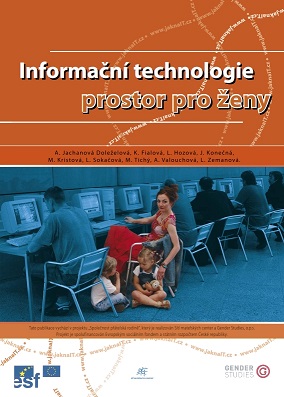
We kindly inform you that, as long as the subject affiliation of our 300.000+ articles is in progress, you might get unsufficient or no results on your third level or second level search. In this case, please broaden your search criteria.









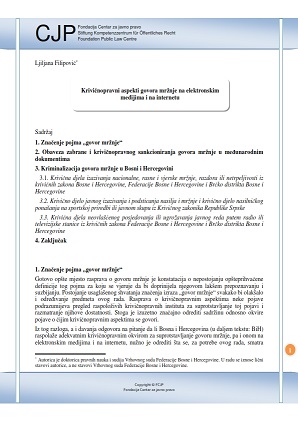
The paper considers some criminal law aspects of “hate speech” on electronic media and internet. After the definition of meaning of the term “hate speech” provided for the needs of the paper, and a review of obligations of the member States concerning prohibition and criminalization of hate speech in certain international legal documents, the paper also gives a review of the manner and scope of criminalization of hate speech in the criminal codes in force in BiH. In addition to an analysis of the principal legal elements of the related criminal offenses, the paper pays a special attention to the preconditions which must be satisfied in order that a conviction for the criminal offense of hate speech is not in violation of the right to free expression as one of the fundamental human rights. The paper also refers to the responsibility of journalists and media for hate speech and its spreading, as well as the responsibility of mediators – service providers for hate speech of others.
More...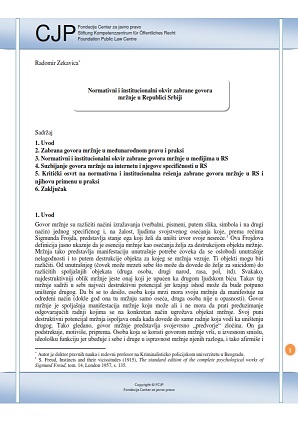
After analyzing the prohibition of hate speech in international law and practice, the author analyzes the normative and institutional framework for hate speech prohibition in Serbia. The analysis points to valid legal solutions to this prohibition, regulations of regulatory bodies that are responsible for combating hate speech in print and electronic media and the Internet, and then provides an overview of institutional mechanisms of protection against hate speech. After that, the author gives a critical overview of the functioning of the normative-institutional framework for the prohibition of hate speech and points to the key problems, first of all: the problem of media freedom, the high degree of non-recognition of the essence of discrimination and hate speech among representatives of the public authorities, the problem regarding the functioning and independence of regulatory bodies, but also the judicial system in general. Political discourse in Serbia is burdened with the spirit of intolerance and rhetoric that often contains hate speech. The fact that pro-government media often appear as actors of such rhetoric is worrying, as it points to the readiness of the public authorities to promote a critical dialogue that is the premise of a healthy democratic society.
More...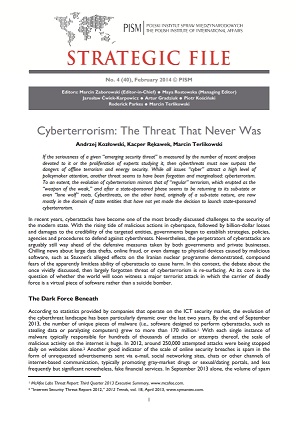
If the seriousness of a given “emerging security threat” is measured by the number of recent analyses devoted to it or the proliferation of experts studying it, then cyberthreats must now surpass the dangers of offline terrorism and energy security. While all issues “cyber” attract a high level of policymaker attention, another threat seems to have been forgotten and marginalised: cyberterrorism. To an extent, the evolution of cyberterrorism mirrors that of “regular” terrorism, which erupted as the “weapon of the weak,” and after a state-sponsored phase seems to be returning to its sub-state or even “lone wolf” roots. Cyberthreats, on the other hand, originally of a sub-state nature, are now mostly in the domain of state entities that have not yet made the decision to launch state-sponsored cyberterrorism.
More...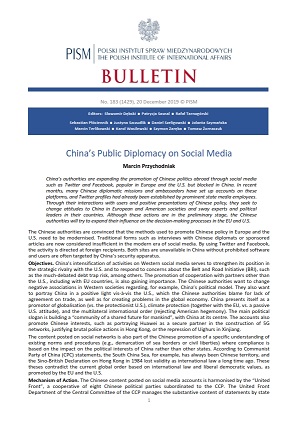
China’s authorities are expanding the promotion of Chinese politics abroad through social media such as Twitter and Facebook, popular in Europe and the U.S. but blocked in China. In recent months, many Chinese diplomatic missions and ambassadors have set up accounts on these platforms, and Twitter profiles had already been established by prominent state media employees. Through their interactions with users and positive presentations of Chinese policy, they seek to change attitudes to China in European and American societies and sway experts and political leaders in their countries. Although these actions are in the preliminary stage, the Chinese authorities will try to expand their influence on the decision-making processes in the EU and U.S.
More...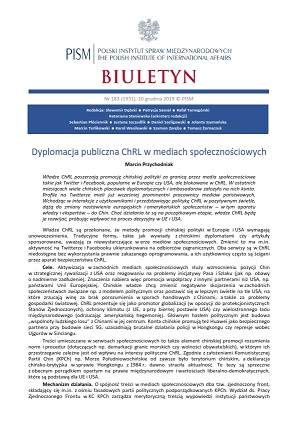
Władze ChRL poszerzają promocję chińskiej polityki za granicą przez media społecznościowe takie jak Twitter i Facebook, popularne w Europie czy USA, ale blokowane w ChRL. W ostatnich miesiącach wiele chińskich placówek dyplomatycznych i ambasadorów założyło na nich konta. Profile na Twitterze mieli już wcześniej prominentni pracownicy mediów państwowych. Wchodząc w interakcje z użytkownikami i przedstawiając politykę ChRL w pozytywnym świetle, dążą do zmiany nastawienia europejskich i amerykańskich społeczeństw – w tym aparatu władzy i ekspertów – do Chin. Choć działania te są na początkowym etapie, władze ChRL będą je rozwijać, próbując wpływać na proces decyzyjny w UE i USA.
More...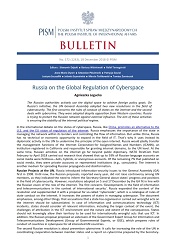
The Russian authorities actively use the digital space to achieve foreign policy goals. On Russia’s initiative, the UN General Assembly adopted two new resolutions in the field of cybersecurity. The first concerns the rules of conduct of states on the internet and the second deals with cybercrime. They were adopted despite opposition from Western countries. Russia is trying to protect the Russian network against external influence. The aim of these activities is ensuring the stability of the internal political regime.
More...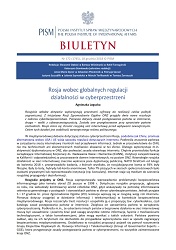
Rosyjskie władze aktywnie wykorzystują przestrzeń cyfrową do realizacji celów polityki zagranicznej. Z inicjatywy Rosji Zgromadzenie Ogólne ONZ przyjęło dwie nowe rezolucje z zakresu cyberbezpieczeństwa. Pierwsza dotyczy zasad postępowania państw w internecie, druga – walki z cyberprzestępczością. Zostały one przegłosowane przy sprzeciwie państw zachodnich. Rosja stara się chronić rosyjską sieć internetową przed wpływami zewnętrznymi. Celem tych działań jest stabilność wewnętrznego reżimu politycznego.
More...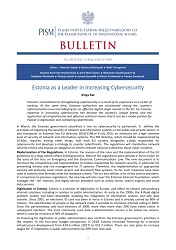
Estonia's commitment to strengthening cybersecurity is a result of its experience as a victim of hacking. At the same time, Estonian authorities are consistently raising the country's informatisation level and lobbying for an effective digital single market in the EU. For Estonia, expertise in increasing cybersecurity has become the country’s unique brand, and the application of comprehensive and effective solutions means that it can be a model partner for Poland in digitisation and combating cyberthreats.
More...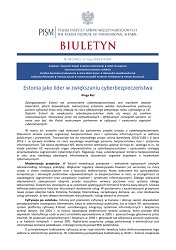
Zaangażowanie Estonii we wzmocnienie cyberbezpieczeństwa jest wynikiem ataków hakerskich, jakich doświadczyła. Jednocześnie estońskie władze konsekwentnie podnoszą poziom cyfryzacji kraju oraz lobbują na rzecz efektywnego jednolitego rynku cyfrowego w UE. Dążenie Estonii do zwiększania cyberbezpieczeństwa stało się wręcz jej znakiem rozpoznawczym. Stosowanie przez nią kompleksowych i efektywnych rozwiązań sprawia, że może ona być dla Polski wzorcowym partnerem w cyfryzacji i zwalczaniu zagrożeń cybernetycznych.
More...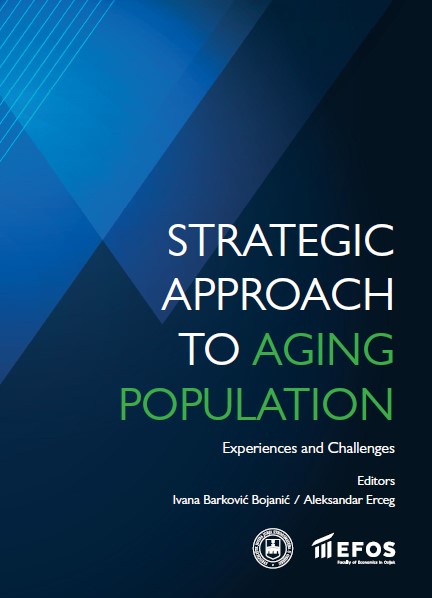
People across the world are living longer. According to the World Health Organization (2018), the world population that is older than 60 years will reach 22% by 2050, amounting to 2 billion people, which is a significant increase from 900 million in 2015. The number of older persons will outnumber children younger than five years. The pace of population aging is much faster than before, forcing all countries to face challenges that age brings, from health issues to human rights issues, each requiring proper policy response. As societies grow older due to increased longevity and improved health, older people change in terms of expectations they have related to life in the retirement age. There are many inspiring examples of older persons who want to pursue new activities, such as education, engage in a new career that corresponds to their passion neglected earlier, or continue to be a productive family or community member. It is not surprising to see that some older persons do not make a direct transition from employment to retirement but rather self-employment, implying a positively inverted U-shaped relationship between age and entrepreneurship. For example, to prove it, let us remember the founders of McDonald’s, Coca Cola and Kentucky Fried Chicken, were all over 50 years old when they established their business. One can conclude that older persons are heterogeneous, making aging difficult to handle research and policy-wise.
More...
Following global trends, social media has become an instrumental part of daily life for most Albanians. Even before the COVID-19 pandemic, it was a primary means for social communication and receiving information on current affairs. Moreover, since the outbreak of the pandemic, social media has cemented its position as an irreplaceable aspect of people’s personal and professional lives. While it is wonderful that the internet allows education, business, and daily life to continue, there are some challenges to such dependency on social media. For example, disinformation spreads six times faster through social media channels than actual news, and social media platforms create opportunities for unsupervised communication, which can lead to harassment, abuse, and blackmail.
More...